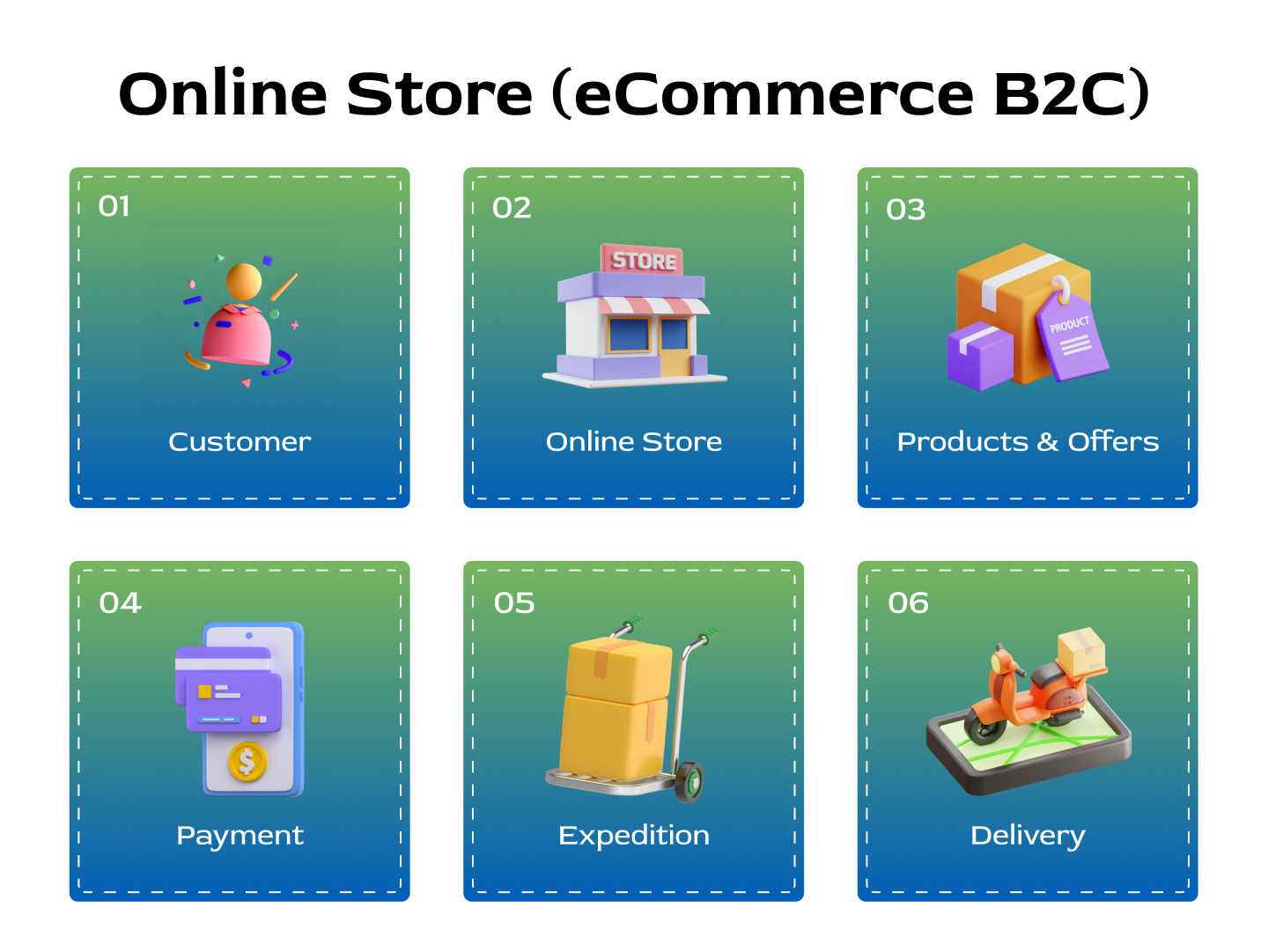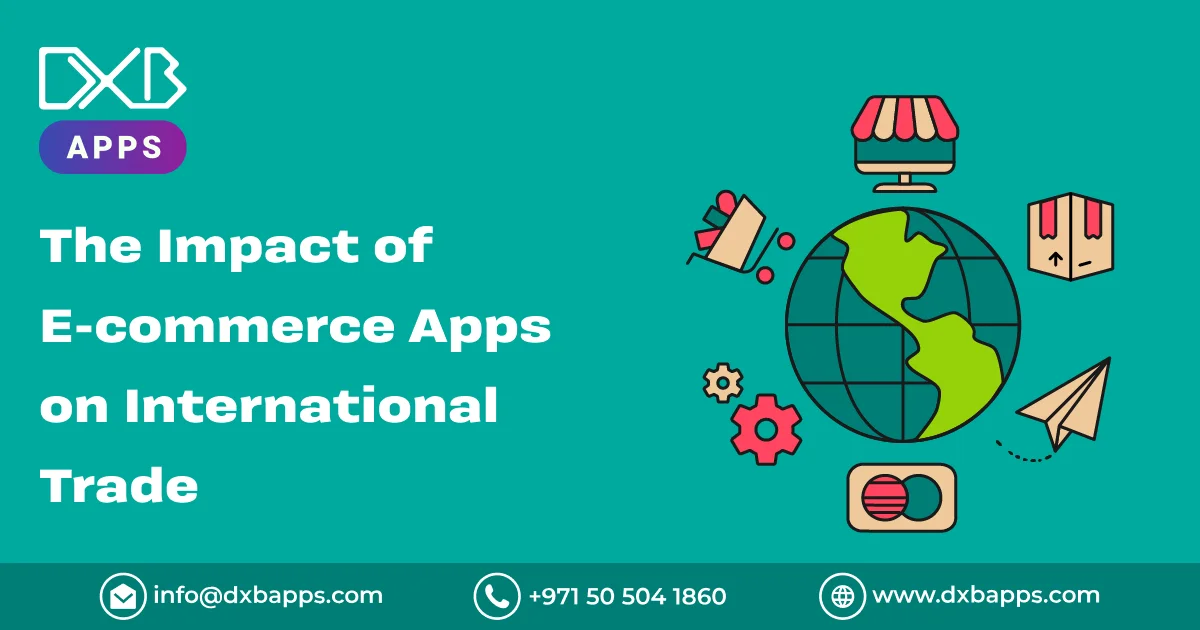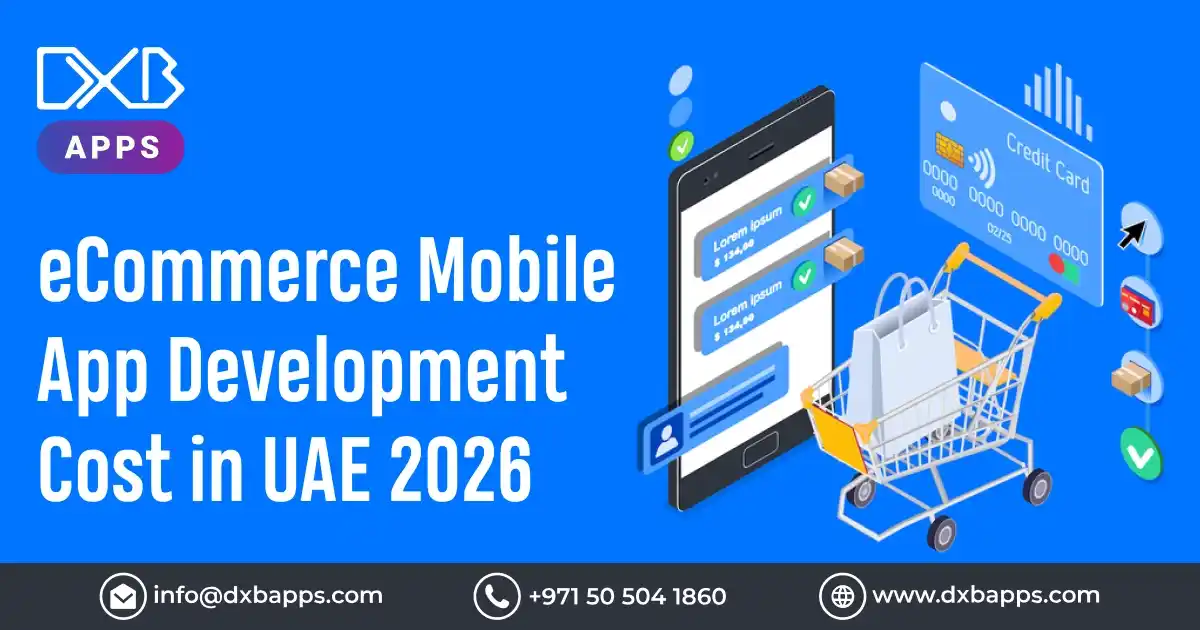The global economy is globalizing as advanced technologies result in technological developments. E-commerce Apps have brought flexibility to international purchases and have a way of breaking barriers to increase global market and business expansion. They are one of the game changers of this age for ecommerce trade. They have enabled companies to break geographical barriers and reach a global audience.
This blog looks at the role of e commerce, benefits of benefits of ecommerce apps, the technologies driving such achievements, and how companies such as DXB APPS are pushing efforts at advanced new e-commerce solutions geared toward an increasingly evolving market.

Role of E-commerce Apps in International Trade
E-commerce apps have changed the complete face of doing business through an online platform that acts as a marketplace where consumers and sellers can meet anywhere. For example, Amazon and Alibaba have enabled SMEs and companies to sell products worldwide without having physical stores.
Bridging the Gap Between Markets
Historically, giant corporations controlled international trade due to the difficulties imposed by logistics and finance. E-commerce sites have opened up the level playing field for small companies to compete globally. According to a 2023 report from the International Trade Centre, SMEs using e-commerce channels have 60% more opportunities to export goods than those using traditional trade transactions.
Efficient Transactions
E-commerce apps take the more accessible functions of secure payment gateways, inventory management, and real-time tracking, simplifying international trade's complexity. Such tools lower the chances of error, guaranteeing ease in transactions between buyers and sellers across regions.
Global e-commerce sales were valued at $5.7 trillion in 2022, thus showing an increase in dependency on such platforms for international trade.
"Empowering businesses, bridging borders—E-commerce apps redefine global trade."
Critical Benefits of E-commerce Apps for Global Businesses
1. Easy access to global markets
E-commerce apps have transformed the face of business when it comes to reaching its global customer base. By breaking geographical distances, geo-targeted advertisements and localized applications from this app bring a company closer to the unique tastes of different customer bases. The apps allow business organizations to change descriptions, pricing, and other payment structures according to local markets, giving customers a seamless and personalized shopping experience. This broadened scope increases sales and encourages brand loyalty among international clients.
2. Cost Efficiency
Since an e-commerce application's online ecommerce store costs much less to run compared to a physical retail model, companies cut down on rent, utilities, and land maintenance. It enables businesses to converge more resources towards quality improvement of products, efficient customer service, and innovative marketing campaigns. Moreover, with technology automation tools coming into play in an e-commerce site, efficiency in the operations improves, bringing down costs and maximising profits.
3. Availability 24/7
Indeed, one of the most significant strengths of e-commerce apps is being open for business twenty-four hours a day. This makes this operation around-the-clock to ensure that different customers worldwide always buy the products. Hence, ecommerce business in Dubai never misses an opportunity to make sales.
It can be midnight shopping in one region or lunch-hour browsing in another; e-commerce apps ensure an uninterrupted user experience. This constant accessibility increases revenue and enhances customer satisfaction by accommodating their convenience.

4. Deep Customer Insight
Applications in online commerce hold the latest analytics of user behaviour and preferences along with purchase history. Such insights enable companies to adjust marketing, customize customer suggestions, and optimize the shopping experience. Understanding a customer's needs more profoundly empowers a company to anticipate trends, replenish its inventory, and launch relevant promotions. Such data-driven practices enhance a customer's engagement and promote sustainable business growth over time.
"E-commerce apps are not just platforms; they are the future of retail, connecting dreams with destinations."
E-commerce Apps and International Trade Policies
Fast growth in e-commerce has changed the nature of international trade, and governments are revising their trade policies to keep up with the new digital economy. With commerce increasingly involving e-commerce platforms in various global markets, regulatory authorities are increasingly finding a need for streamlined procedures that support digital trade. The old, highly traditionalist laws governing trade, mainly practised with physical goods, must be adapted to keep pace with the digital revolution.
For instance, the WTO has been proactive regarding e-commerce, especially data protection, cybersecurity, and regulations on online payment. Therefore, as long as the WTO focuses on e-commerce, then it is bound to introduce an atmosphere that accommodates international trade without any old-fashioned regulations restricting such progress in intellectual property rights while at the same time protecting consumers in this cyber world.
Streamlined Customs Formalities
Complex customs procedures and the resultant delays are the most significant issues for international e-commerce. Newer e-commerce platforms, however, are working with governments to digitalize solutions that ease customs clearance processes. Automated systems and the digitalization of documentation reduce the time necessary for clearing customs and deliverable products internationally. This helps businesses expedite delivery services and end customers as customers get their orders faster. E-commerce applications are bridging physical logistics and digital trade by making international trade more efficient and accessible.
Cross Border Payment Innovations
International trade also faces the complexity of cross-border payment, often marked by high fees and long processing times. Coincidentally, currency exchange is also a challenge in traditional banking systems. Here are the e-commerce apps that are innovating solutions to payment, such as digital wallets and peer-to-peer payment systems, with some even in cryptocurrencies. These solutions provide safe, fast, and cost-effective payment solutions away from traditional banking methods, thus making it easier for businesses to engage in international trade.

Emerging Trends in E-commerce App Development
New trends in e-commerce apps keep shaping the way businesses interact with consumers. Technology and the emphasis on greater personalization, efficiency, and user-friendliness in online shopping lie behind these trends in e-commerce app development. A few are as follows:
1. Artificial Intelligence for Personalization
Customer Experience is increasingly being determined and optimised by Artificial Intelligence in an e-commerce app. As a result, AI algorithms can use large amounts of analysed customer data to forecast users' interests and offer relevant product recommendations. This results in improved user satisfaction and increases conversions, as when the user feels that the app 'knows more about him’, he is more likely to make purchasing decisions. Such a customized search and related marketing is the only way to sell in a competitive market and keep customers returning for more.
2. Voice Commerce
Voice commerce with voice assistants like Amazon's Alexa, Google, and Apple’s Siri is expanding daily. Buyers can search by products, place items into a shopping cart, and even purchase a product using voice commands alone. These time-starved consumers find this a convenient way to round off in terms of effectiveness and convenience. Voice commerce is expected to fundamentally alter the e-commerce enterprise as it creates new possibilities for access and convenience for disabled buyers or those with hectic schedules.
3. AR
Of all the elements valued in e-commerce app development, augmented reality is one of the most perspectives. AR makes Online shopping more enjoyable, easing decision-making as customers get to picture how such products will be in real life. For instance, AR in a service context may allow a customer to check whether a piece of furniture fits the room in their house or how a particular dress fits them without actually buying it. This feature is a big plus for all the categories, for which the notion ‘see and touch’ remains the only credo of the customer.
4. Sustainability Features
Higher levels of concern about the environment drive most companies involved in e-commerce to extend sustainability components in their apps to address the increasing call for green products and services. Features like carbon footprint tracking, filtering of products based on being environmentally friendly, and options to carry out 'environment-friendly packages' enable the users to make better buying decisions. These features not only align with the values of an 'ecologically aware consumer', but they also reflect the growing importance of corporate social responsibility in the modern ecommerce business landscape.
Problems in E-commerce and How Apps Overcome Them
Although e-commerce apps carry several benefits, they also have many challenges. However, e-commerce platforms infused with advanced technologies are helping businesses overcome such challenges. Below are some of the main challenges and their solution by e-commerce apps:
Cybersecurity
Without question, one of the most important issues arising in e-commerce companies today is the issue of customers’ data security and the security of each transaction. The recent rise in internet scams, hacking, and data losses requires organizations to step up their game and safeguard their clients' platforms and data. The new-generation e-commerce applications, in particular, are implementing the most advanced high-tech safety features, such as encryption, MFA, and blockchain, to improve the overall experience.
Logistics and Delivery
Transportation is one of the most immense challenges in the e-commerce industry, especially in final-mile transportation. Delivery should occur on time and at a low cost so that they can impress their customers. Innovations like drone deliveries, AI-driven logistics management, and autonomous vehicles would be at par to overcome such logjams and revolutionize e-commerce.
Regulatory Compliance
International trade regulations also constitute a complex maze from which businesses involved in global e-commerce can escape. Tax policies, import and export laws, and consumer protection regulations differ for every country. E-commerce apps empower businesses to follow such complicated laws by providing tools and resources that make the process easy.
How Does DXB APPS Make the Best E-commerce Apps?
DXB APPS was one of the first organizations to set its name in Mobile App Development Dubai as a robust company. The Mobile App Development Company creates tailored ecommerce app development services according to the specific needs of a business. By integrating the latest AI, blockchain, and augmented reality technologies, DXB APPS ensures that the solutions provided are efficient and future-proofed.
Whether you're a startup exploring ecommerce business ideas or an already established enterprise looking to upgrade your ecommerce platforms, DXB APPS provides the tools and expertise to help you succeed.
Conclusion
The transformative impact of E-commerce Apps on international trade is undeniable, whether in their widening access to markets or streamlining the transactions inspired by them as businesses have grown through globalization. Potentials are limitless if technologies continue to evolve for e-commerce apps.
Whether you are a beginner entrepreneur searching for a new ecommerce business idea or a well-established company that wants to update your existing e-commerce store, contracting with professionals like DXB APPS will lead to your success in an unmatched market.
FAQs
1. How do e-commerce apps facilitate the maximum exploitation of global trade opportunities?
E-commerce apps provide an opportunity to open up the tremendous potential of cross-border transactions by making them less complex. They allow business owners to expose their products to an international customer base irrespective of the physical storefronts and geographical bounds. Added features such as secure payment systems, multilingual support, and international shipping options make it easier for companies to operate in multiple markets, creating seamless trade and driving business growth on a global scale.
2. What are the technologies that drive e-commerce applications?
E-commerce applications grow with emerging cutting-edge technologies that enhance functionality and improve user experience. AI allows for personalized recommendations and customer behaviour prediction, while blockchain facilitates transparent transactions. Shopping is brought to life through augmented reality, enabling users to visualize products in their space, and data analytics brings insights into consumer behaviour.
3. Why is DXB APPS the best in e-commerce app development?
DXB APPS is unique in e-commerce application development, implementing the latest technologies such as AI and blockchain and making it user-centric. Their solutions are highly scalable, which means businesses have no limits to expansion. Of course, security comes first, so features that protect customer data are vigorously implemented at DXB APPS.
4. What are some challenges for international e-commerce trade?
Cybersecurity risks, such as threats to sensitive customer and business data and logistics bottlenecks like shipping delays across borders, plague international e-commerce trade. Businesses have also often struggled with diverse and complex regulations related to trade and taxation.

















